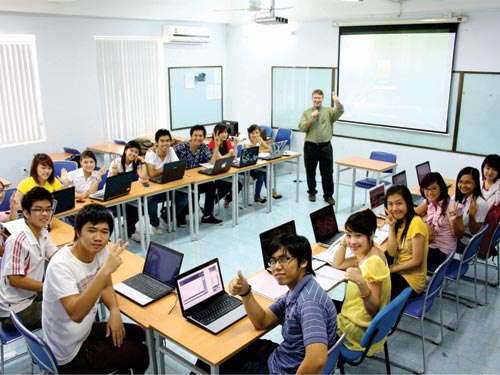VietNamNet Bridge - HCM City leaders are making aggressive moves to turn Saigon into the Silicon Valley of Vietnam.

In an 11-page document issued by the city authorities in August about the program to support small and medium-sized enterprises’ innovation to 2020, there are five projects on start-ups. This is considered one of the first concrete steps in terms of policy to realize the ambition to turn the city into a Silicon Valley of Vietnam.
HCM City aims to directly and indirectly support 2,000 start-ups project from now to 2020 through consultancy, training, connections, incubation activities ...
To do this, 40,000m2 of floor and two international-standard incubators will be created for the startup community. In the next four years; 50% of secondary schools in the city will have clubs on innovation; andv20 universities and colleges will have courses on startups.
The city has made many moves to support start-ups.
The Saigon Hi-Tech Park Incubation Centre (SHTP-IC) put into operation an Innovation Lab on April 8 in order to promote research, creativity and start-ups in business incubation projects.
The Innovation Lab is an open space equipped with the necessary infrastructure for the development of products in information technology and electrical-electronic-telecom sectors.
It is open to both individuals and organisations.
Deputy head of SHTP-IC management board Duong Minh Tam said the Innovation Lab will help to increase competitiveness in creativity and innovation among individuals and organizations working in advanced technology.
In June the city announced the introduction of a credit support package for startups worth VND1 trillion ($45 million).
City Chairman Nguyen Thanh Phong said that the funds will come from its budget and provide support to startups in management, technology, and access to bank credit.
Businesspeople under 35 years of age will be prioritized. The city will hold exchange meetings between youth, undergraduate students, and successful businesspeople and will also organize startup clubs.
He also promised to reform administrative procedures, revoke illegal permits, and tackle counterfeiting and trade fraud.
Nguyen Trong Hoai, Vice Principal of HCM City’s University of Economics, said that his university will soon begin introducing training courses titled ‘Start-up Administration’.
In July the HCM City Young Businesspeople Association (YBA) said it would support 1,000 creative start-up projects during the 2016-2020 period. The association will also accompany 300 start-ups and calls for VND500 billion ($22.5 million) investments in more than 100 others.
In August, the Saigon Innovation Hub (SIHUB) was launched by the HCM City Energy Conservation Centre (ECC) under the municipal Department of Science and Technology.
Director of the Department of Science and Technology Nguyen Viet Dung said SIHUB will be a channel linking the department and the startup community; hence they will make use of the city’s supporting policies, and public resources.
SIHUB will prioritize projects in four key industrial sectors of the city: food processing, electronic-information technology, mechanical manufacturing, and chemistry (rubber, plastic, pharmaceuticals).
HCM City, one of the country’s largest economic hubs, is targeting to expand the number of enterprises in the city to 500,000 by 2020, according to its draft plan announced earlier this month.
Currently, the city has 270,000 registered firms, or 31.7 percent of country’s total including 170,000 in operation. It also has 250,000 private family businesses with high potential to develop into companies.
In 2015 non-State enterprises contributed 24.5 percent of the city’s GDP and 15.7 percent of its budget revenue.
Son Nam